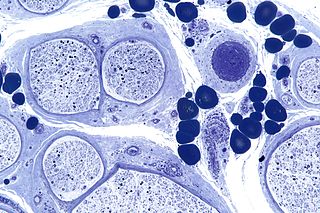
The National Institute of Neurological Disorders and Stroke (NINDS) is a part of the U.S. National Institutes of Health (NIH). It conducts and funds research on brain and nervous system disorders and has a budget of just over US$2.03 billion. The mission of NINDS is "to reduce the burden of neurological disease—a burden borne by every age group, every segment of society, and people all over the world". NINDS has established two major branches for research: an extramural branch that funds studies outside the NIH, and an intramural branch that funds research inside the NIH. Most of NINDS' budget goes to fund extramural research. NINDS' basic science research focuses on studies of the fundamental biology of the brain and nervous system, genetics, neurodegeneration, learning and memory, motor control, brain repair, and synapses. NINDS also funds clinical research related to diseases and disorders of the brain and nervous system, e.g. AIDS, Alzheimer's disease, epilepsy, muscular dystrophy, multiple sclerosis, Parkinson's disease, spinal cord injury, stroke, and traumatic brain injury.
Diabetic neuropathy is various types of nerve damage associated with diabetes mellitus. Symptoms depend on the site of nerve damage and can include motor changes such as weakness; sensory symptoms such as numbness, tingling, or pain; or autonomic changes such as urinary symptoms. These changes are thought to result from a microvascular injury involving small blood vessels that supply nerves. Relatively common conditions which may be associated with diabetic neuropathy include distal symmetric polyneuropathy; third, fourth, or sixth cranial nerve palsy; mononeuropathy; mononeuropathy multiplex; diabetic amyotrophy; and autonomic neuropathy.
The National Institute of Arthritis and Musculoskeletal and Skin Diseases (NIAMS) is one of the institutes and centers that make up the National Institutes of Health, an agency of the United States Department of Health and Human Services (HHS).

Peripheral neuropathy, often shortened to neuropathy, is a general term describing damage or disease affecting the nerves. Damage to nerves may impair sensation, movement, gland function, and/or organ function depending on which nerves are affected. Neuropathy affecting motor, sensory, or autonomic nerves result in different symptoms. More than one type of nerve may be affected simultaneously. Peripheral neuropathy may be acute or chronic, and may be reversible or permanent.

Polyneuropathy is damage or disease affecting peripheral nerves in roughly the same areas on both sides of the body, featuring weakness, numbness, and burning pain. It usually begins in the hands and feet and may progress to the arms and legs and sometimes to other parts of the body where it may affect the autonomic nervous system. It may be acute or chronic. A number of different disorders may cause polyneuropathy, including diabetes and some types of Guillain–Barré syndrome.

Leonard M. Miller School of Medicine (UMMSM) is the University of Miami's graduate medical school in Miami, Florida. Founded in 1952, it is the oldest medical school in the state of Florida.
The Kolling Institute is located in the grounds of the Royal North Shore Hospital in St Leonards, Sydney Australia. The institute, founded in 1920, is the oldest medical research institute in New South Wales.

Gregory A. Petsko is an American biochemist and member of the National Academy of Sciences, the National Academy of Medicine, the American Academy of Arts and Sciences, and the American Philosophical Society. He is currently Professor of Neurology at the Ann Romney Center for Neurologic Diseases at Harvard Medical School and Brigham and Women's Hospital. He formerly had an endowed professorship in Neurology and Neuroscience at Weill Cornell Medical College and is still an adjunct professor of Biomedical Engineering at Cornell University, and is also the Gyula and Katica Tauber Professor, Emeritus, in biochemistry and chemistry at Brandeis University. On October 24, 2023, in a ceremony in the East Room of the White House, President Joe Biden presented Gregory Petsko and eight others with the National Medal of Science, the highest honor the United States can bestow on a scientist and engineer.
Orla Hardiman is an Irish consultant neurologist. She was appointed Professor of Neurology by Trinity College University of Dublin in 2014, where she heads the Academic Unit of Neurology, housed in Trinity Biomedical Sciences Institute. She is a HRB Clinician Scientist and Consultant Neurologist at the National Neuroscience Center of Ireland at Beaumont Hospital, Dublin. She leads a team of thirty researchers focusing on clinical and translational aspects of amyotrophic lateral sclerosis and related neurodegenerations. Hardiman has become a prominent advocate for neurological patients in Ireland, and for patients within the Irish health system generally. She is co-founder of the Neurological Alliance of Ireland and Doctors Alliance for Better Public Healthcare. In the past, she established the bi-annual Diaspora Meeting, a forum for Irish neurologists based overseas to present and discuss their research findings with neurologists working in Ireland.
Peter Henry St George-Hyslop, OC, FRS, FRSC, FRCPC, is a British and Canadian medical scientist, neurologist and molecular geneticist who is known for his research into neurodegenerative diseases. St George-Hyslop is one of the most cited authors in the field of Alzheimer's disease research. He has identified a number of key genes that are responsible for nerve cell degeneration and early-onset forms of Alzheimer's disease. These include the discovery of the presenilins, Nicastrin, and SORL1 genes. Presenilin mutations are the most common cause of familial Alzheimer's disease. St George-Hyslop also co-led the discovery of the gene for the amyloid precursor protein.

Gladstone Institutes is an independent, non-profit biomedical research organization whose focus is to better understand, prevent, treat and cure cardiovascular, viral and neurological conditions such as heart failure, HIV/AIDS and Alzheimer's disease. Its researchers study these diseases using techniques of basic and translational science. Another focus at Gladstone is building on the development of induced pluripotent stem cell technology by one of its investigators, 2012 Nobel Laureate Shinya Yamanaka, to improve drug discovery, personalized medicine and tissue regeneration.
Clifford J. Woolf is professor of neurology and neurobiology at Harvard Medical School and director of the F.M. Kirby Neurobiology Center at Boston Children’s Hospital. He has added greatly to the understanding of pain.

Jan A. Nolta is an American scientist and the director of the stem cell program at the UC Davis School of Medicine and Institute for Regenerative Cures. She is Scientific Director for the UC Davis Good Manufacturing Practice and editor of the journal Stem Cells. Nolta is known for her work with stem cell-related regenerative medicine. Nolta's current research focuses on treatment of Huntington's disease using mesenchymal stem cells. She was elected a AAAS Fellow in 2013.

Griffin P. Rodgers is the director of the National Institute of Diabetes and Digestive and Kidney Diseases, one of the 27 institutes that make up the United States National Institutes of Health. He is also the Chief of the institute's Molecular and Clinical Hematology Branch and is known for contributions to research and therapy for sickle cell anemia.

Howard L. Weiner is an American neurologist, neuroscientist and immunologist who is also a writer and filmmaker. He performs clinical and basic research focused on multiple sclerosis (MS) and other neurologic diseases such as Alzheimer's disease and Lou Gehrig's disease (ALS). His work also focuses on autoimmune diseases such as diabetes. Weiner is the Robert L. Kroc Professor of Neurology at Harvard Medical School, director of the Brigham MS Center at the Brigham and Women's Hospital and co-director of the Ann Romney Center for Neurologic Diseases established in 2014, at the Brigham and Women's Hospital in Boston, Massachusetts.

Rajiv Ratan is an Indian American academic, professor, administrator and scientist based in New York. He is the Burke Professor of Neurology and Neuroscience at Weill Cornell Medicine. Since 2003, he has served as the executive director of Burke Neurological Institute and as a member of the Council of Affiliated Deans of Weill Cornell Medicine.

Giulio Maria Pasinetti is the Program Director of the Center on Molecular Integrative Neuroresilience and is the Saunders Family Chair in Neurology at the Icahn School of Medicine at Mount Sinai (ISMMS) in New York City. Pasinetti is a Professor of Neurology, Psychiatry, Neuroscience, and Geriatrics and Palliative Medicine at ISMMS.
Peripheral mononeuropathy is a nerve related disease where a single nerve, that is used to transport messages from the brain to the peripheral body, is diseased or damaged. Peripheral neuropathy is a general term that indicates any disorder of the peripheral nervous system. The name of the disorder itself can be broken down in order to understand this better; peripheral: in regard to peripheral neuropathy, refers to outside of the brain and spinal cord; neuro: means nerve related; -pathy; means disease. Peripheral mononeuropathy is a disorder that links to Peripheral Neuropathy, as it only effects a single peripheral nerve rather than several damaged or diseased nerves throughout the body. Healthy peripheral nerves are able to “carry messages from the brain and spinal cord to muscles, organs, and other body tissues”.
Kristin K. Baldwin is an American scientist who is a professor at the Department of Genetics and Development at Columbia University. Her research focuses on using reprogrammed and induced pluripotent stem cells to identify mechanisms and therapies related to human genetic risk for neurologic and cardiovascular disease. Her lab also studies how disease and aging affect the genome; they have used cloning to produce the first complete genome sequence of a single neuron and helped assess the effect of aging on induced pluripotent stem cells that may be used for cell therapies. They also design bespoke neuronal cells in a dish to understand brain function and disease. Baldwin's earlier work included being the first to clone a mouse from a neuron and being one of three groups to first produce an entire mouse from a skin cell by generating induced pluripotent stem cells. epigenetic changes of the genome and the brain.
Catarina Resende de Oliveira is a Portuguese neurologist, researcher, university professor, and doctor. A full professor of biochemistry at the Faculty of Medicine of the University of Coimbra, she studies the processes that cause neurological degeneration responsible for illnesses such as Alzheimer's disease and Parkinson's disease.











